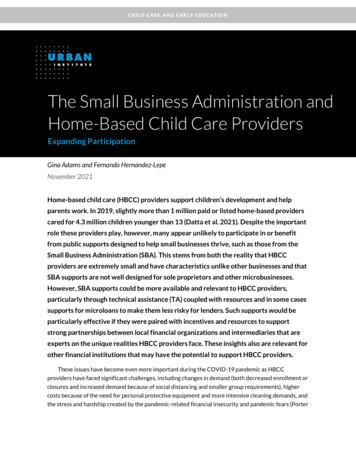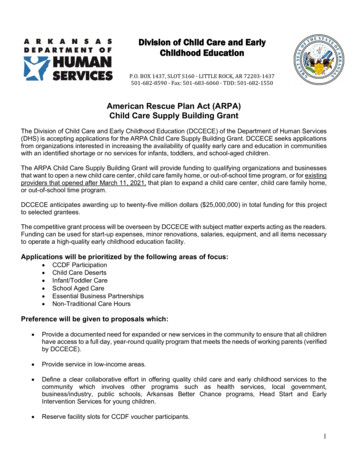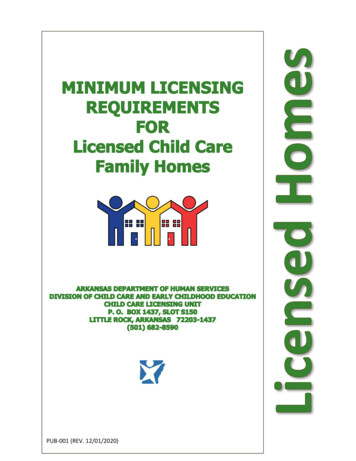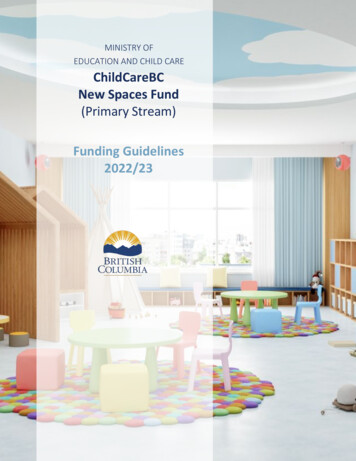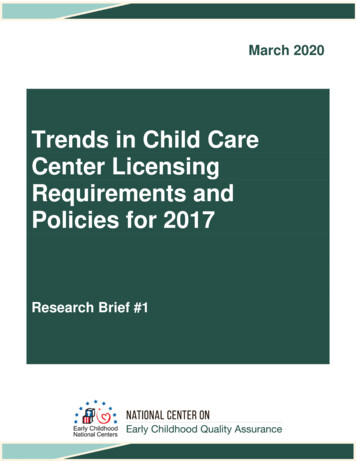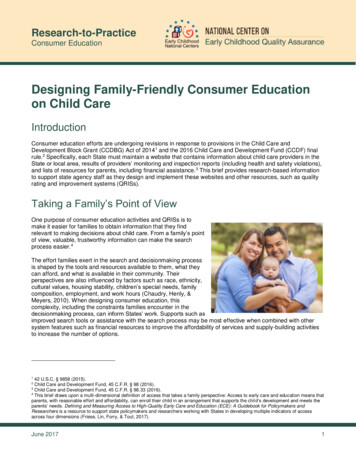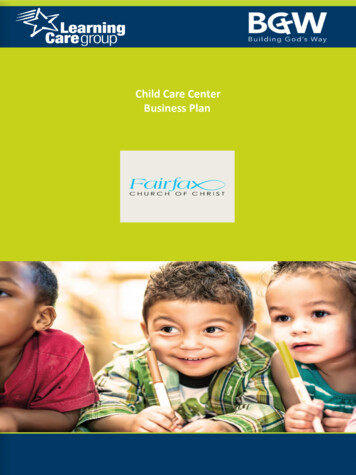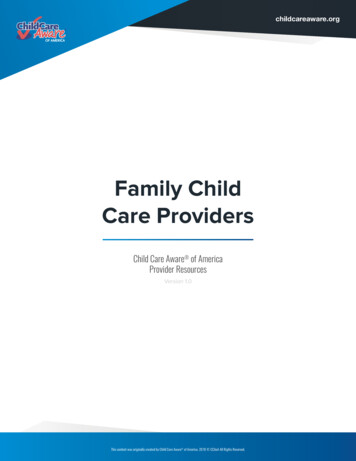
Transcription
childcareaware.orgFamily ChildCare ProvidersChild Care Aware of AmericaProvider ResourcesVersion 1.0This content was originally created by Child Care Aware of America. 2018 CCAoA All Rights Reserved.
childcareaware.orgThere are many things toconsider when startinga new family child carebusiness. Read through theseresources to help you think through thesteps you need to take to operate asuccessful child care program.Table of Contents102 Family Child Care03 Opening a FamilyChild Care Home34 perating a SuccessfulOFamily Child Care Home54 Training EssentialsThis content was originally created by Child Care Aware of America. 2018 CCAoA All Rights Reserved.Family Child Care Provider Resources
childcareaware.orgFamily Child CareA family child care home is a placewhere a small group of children are caredfor in a residential setting for a fee. Oftenthis type of care and education is offeredin your home and may offer non-traditionalhours. Most states require family childcare homes to be regulated or licensed.Regulations vary from state to state,and your local Child Care Resource andReferral (CCR&R) agency can help youunderstand the requirements in your state.2This content was originally created by Child Care Aware of America. 2018 CCAoA All Rights Reserved.Family Child Care Provider Resources
childcareaware.orgOpening a Child Care ProgramAre you interested in opening a childcare business? This section will help youlearn more about what you need to do tostart a child care business.There are different resources for you tocomplete to help you build your businessplan throughout these sections. Theseresources are meant to help you thinkthrough important questions. Your localChild Care Resource and Referral (CCR&R)agency and your local licensing agency canhelp you understand the specific rules andregulations you need to follow to operatea quality program. They will be importantresources for you as you begin your childcare business.Before you begin your new career path,find out if child care is the right choice foryou to help you evaluate why you want tostart a child care business. It will help youthink through some important considerationsbefore you open a family child care home.3In this section:04 Are You Ready to Open aChild Care Business?06 Complete aNeeds Assessment12 Learn about Licensing andBackground Checks16 Research Legal, Tax, andInsurance Considerations19 Prepare a Budget21 Find a Location25 Develop Policiesand ProceduresHire Staff28 29 Market Your ProgramThis content was originally created by Child Care Aware of America. 2018 CCAoA All Rights Reserved.Family Child Care Provider Resources
childcareaware.orgResource: Are You Ready to Start a Child Care Business?This checklist is meant to help you think about the reasons why you want to open a family child carebusiness and if it is the right choice for you and your family. There are both personal and professionalconsiderations for you to think about as you start your journey.Personal ConsiderationsOpening a family child care business can impact your entire family. Think through these considerationsas you complete the checklist below.YesNoUnsureDo you have a passion for helping children and their parents?Do you enjoy being with young children and have the patience to care for them for manyhours each day?Do you have the necessary education and training requirements for a family child careprovider in your state?Are you able to get along with multiple types of parents and children, even if their parentingstyle or culture is different than yours?Do you have the physical and emotional strength to run a family child care business?If you have children or other people in your life that need you during child care hoursof operation, have you identified someone to care for them if they become sick or needsomething?Do you have a positive attitude, even when things don’t go your way?Does your family support your decision?If your children are old enough, have you talked to them about the possibility of a family childcare business in your home?If you are considering using your home as the family child care business, have you thoughtabout which areas of your home you would use?If you use your own home and have children of your own, will your children have their ownspace separate from the child care program when needed?4This content was originally created by Child Care Aware of America. 2018 CCAoA All Rights Reserved.Family Child Care Provider Resources
childcareaware.orgAre You Ready to Open a Child Care Business continuedYesNoUnsureYesNoUnsureIf you use your own home and have your own children, do you have a space where yourchildren’s belongings, such as special toys and equipment can be stored away from the toysthat belong to the child care?Professional ConsiderationsAre you a self-starter?Do you have knowledge and previous experience to run a family child care business?Do you know where to go to for training or help in running your child care business?Are you comfortable working with licensing requirements and government regulationspertaining to child care?Do you have the time to learn the skills you need or are you willing to hire people withdifferent skill sets that you need to have a successful family child care business?Are you able to plan and organize well? Think about having multiple children in your home allday and how you would plan for them.Are you comfortable with the potential legal, professional, and personal risks associated withstarting a new business?Have you undertaken similar responsibilities that have demonstrated that you have the driveand determination needed to make your business successful?Do you have access to funds you may need to start your business?Are you aware of the required amount of business and professional liability insurance youneed for your business?Next Steps:If you checked “Yes” to all the items, you are probably ready to continue exploring the next steps in starting your family childcare business!If you checked “No” or “Not Sure” to some of the items, reach out to your local Child Care Resource and Referral (CCR&R)agency for help.5This content was originally created by Child Care Aware of America. 2018 CCAoA All Rights Reserved.Family Child Care Provider Resources
childcareaware.orgOpening a Family Child Care Program continuedComplete a Needs AssessmentUnderstanding the community need forchild care is critical for your business to besuccessful. Use this needs assessment toget started and call your local Child CareResource and Referral (CCR&R) agency forhelp in answering some of these questions.This is an important first step in building yourbusiness plan.6This content was originally created by Child Care Aware of America. 2018 CCAoA All Rights Reserved.Family Child Care Provider Resources
childcareaware.orgResource: Family Child Care Needs AssessmentAs you continue to explore opening a family child care business, take the time to do a complete andthorough needs assessment. This is a critical step in determining whether your community needs yourservices. One of the reasons that business owners of all types fail is because they have not consideredthe needs of their consumers.There are three parts to the Needs Assessment. First, you need to have data on what type of child carecurrently is being offered in your community. Second, you will want to understand more about familiesthat you might serve through your family child care business. Finally, you will want to know what otherproviders in your area charge for child care. This will help you build your budget.You may need help completing your needs assessment. Your local Child Care Resource and Referralagency (CCR&R) will be able to help you with much of this information. Your first step will be to learnwhich CCR&R agency serves your area.Name of Local Child Care and Resource Referral Agency:Contact Person:Phone Number:Email:Many of the questions in this resource can be answered by your local CCR&R. Have this checklist handywhen you contact them and fill in answers or comments as you speak with a representative.7This content was originally created by Child Care Aware of America. 2018 CCAoA All Rights Reserved.Family Child Care Provider Resources
childcareaware.orgFamily Child Care Needs Assessment continuedPart 1: Current Child Care LandscapeQuestionAnswer/CommentNumber of family child care homes:Who else is providing child care in your area?Number of licensed child care centers:Ask your local Child Care Resource and Referral (CCR&R)agency about the number of providers in your area.Number of school-based providers:Other:Who are your main competitors?In the geographic area of where you want to open your business,who provides child care services? Think about churches, localYMCAs, and schools as well as traditional child care providers.Infants (birth-12 months):Is there a child care need for a specific age group?Toddlers (1-2 years):Think about the current providers in the area and what agegroups they are serving. Ask your local Child Care Resourceand Referral agency if there is a need for infant/toddler careor other age groups.Preschool (3 years):Pre-K (4-5 years old):Before/after care for school-age children:Is there a need for child care during a specifictime of the day?Think about whether you might provide care during nontraditional hours, before/after school care to school-agechildren, or children enrolled in part-time pre-k programs.Is the need for child care in your area likely to change inthe next 5-10 years? Why?Think about whether there are local companies that areexpanding or closing, whether your local schools may beproviding child care services, or other factors that couldinfluence the need.8This content was originally created by Child Care Aware of America. 2018 CCAoA All Rights Reserved.Family Child Care Provider Resources
childcareaware.orgFamily Child Care Needs Assessment continuedPart 2: Family DemographicsQuestionAnswer/CommentHow many families with young children live in your area?Consider families with children birth-5 years, as well as familieswith school-age children if you want to serve that age group.How many of the families with young children in yourarea will need child care?Ask your local Child Care Resource and Referral agency forcurrent statistics on the number of families that may need care.Where do local parents work? What are typicalworking hours?Think about the parents that might use your program. Somebusinesses, such as hospitals, factories, emergency services, etc.,are open in non-traditional hours. Or, some parents may work fororganizations that have more typical work hours. You will want tothink about parent needs in designing your program.How long is the typical commute?Do parents live in suburban areas and commute to a more urbanarea for work? Are you in a rural area where commute times maybe longer? You will need to think about these things as you thinkabout your hours of operation.9This content was originally created by Child Care Aware of America. 2018 CCAoA All Rights Reserved.Family Child Care Provider Resources
childcareaware.orgFamily Child Care Needs Assessment continuedPart 3: Determine CostsQuestionAnswer/CommentLicensed family child care rate:What are the typical fees (the market rate)for child care in your area?Check with your local Child Care Resource andReferral (CCR&R) agency for this information.Infants: /weekToddlers: /weekPreschool: /weekPre-K: /weekSchool-age: /weekLicensed child care center rate:Infants: /weekToddlers: /weekPreschool: /weekPre-K: /weekSchool-age: /weekOther:Do parents in your area typically get help (subsidies) topay for child care?YesNoWill your program be eligible to accept subsidies?YesNoWhat would your program need in order to beeligible to accept subsidies?10This content was originally created by Child Care Aware of America. 2018 CCAoA All Rights Reserved.Family Child Care Provider Resources
childcareaware.orgFamily Child Care Needs Assessment continuedQuestionAnswer/CommentBased on the number of children you plan to enroll, whatis your per child cost?Contact your local Child Care Resource and Referral (CCR&R)agency for help in calculating this information.What fees do you need to charge parents to have aprofitable program? Can parents in your area afford thefees?Contact your local Child Care Resource and Referral (CCR&R)agency for help in calculating this information.Infants: /weekToddlers: /weekPreschool: /weekPre-K: /weekSchool-age: /weekInfants: /weekToddlers: /weekPreschool: /weekPre-K: /weekSchool-age: /weekHow much will it cost you to start a new child carebusiness? How much will it cost you to operate on anongoing basis?Contact your local Child Care Resource and Referral (CCR&R)agency for help in calculating this information or use theProvider Cost of Quality Calculator.Will you need to hire staff? What will you pay the staff?Will you be able to offer any benefits?11This content was originally created by Child Care Aware of America. 2018 CCAoA All Rights Reserved.Family Child Care Provider Resources
childcareaware.orgOpening a Family Child Care Program continuedLearn about Licensing and Background ChecksWhat is a child care license?A child care license allows you to legally operate yourchild care program. To get a license, you must meet theminimum health, safety, and program standards set by yourstate. Child care licensing regulations vary by state. Contactyour state licensing agency or your local Child CareResource and Referral (CCR&R) agency for information onyour state’s licensing requirements.How do I become a licensed familychild care provider?Each state has a different process for becominglicensed. Contact your local Child Care Resource andReferral (CCR&R) agency or your local or state child carelicensing office by visiting our State by State Resource Mapfor information on your state’s licensing requirements. Usethis resource when talking to your local CCR&R agency tohelp you understand your state’s licensing regulations.Most states will require an application, backgroundchecks, licensing and fire inspections, and certain traininghours to be completed before a license is issued. Someprograms may be exempt from licensing, depending onthe type of program, where and when it operates, and thenumber of children in care.What type of backgroundchecks do I need?What does a child care license cover?There are a variety of standards covered by a childcare license. Although states will vary, most cover thefollowing topics: 12The maximum number of children allowed in the setting(group size), and the minimum number of adults required fora specific number of children (adult-child ratio), depending onthe age of the children Health and safety standards on immunizations, handwashing,diapering, administering medication, reporting accidents andillnesses, safe sleep procedures, playground safety,and emergency preparedness plans Nutrition and food preparation Fire and safety drills Record keeping Minimum education requirements and ongoingtraining for providers Family engagementNew federal law requires states to conduct criminalbackground checks on all child care employees that work ata licensed, license-exempt, regulated, and registered childcare provider. In addition, all adults living in the family childcare home need to have a background check. Your localChild Care Resource and Referral (CCR&R) agency canupdate you on where your state is with implementation ofthis new law.Use this resource when talking to your local CCR&Ragency to help you understand the steps you need to followto obtain a background check.This content was originally created by Child Care Aware of America. 2018 CCAoA All Rights Reserved.Family Child Care Provider Resources
childcareaware.orgResource: Licensing and Background ChecksCheck with your local Child Care Resource and Referral (CCR&R) agency or your local or state child carelicensing office by visiting our State by State Resource Map for information on your state’s licensing andbackground check requirements. Every state has different licensing requirements and your local CCR&R canhelp you learn about the regulations for family child care homes in your state. Over the next several years,new federal law will require states to conduct criminal background checks on all child care employees thatwork at a licensed, license-exempt, regulated, and registered child care provider.Use this checklist to ask questions of your local Child Care Resource and Referral (CCR&R) agency or yourstate licensing consultant to help you think through the steps you will need to take to become a licensedfamily child care provider and to obtain a background check.QuestionResponseCommentDo I need to have a license in orderto open a family child care home?YesNoIf I choose not to becomelicensed, have I contacted my localChild Care Resource and Referral(CCR&R) agency to help meprovide quality care?YesNoIs there a fee to get licensed,and if so, how much?YesNoDoes my program have to beinspected?YesNoWho conducts the inspections andhow frequently do they occur?Infants:Toddlers:How many children can I carefor at one time?Preschool:Pre-K:School-age:13This content was originally created by Child Care Aware of America. 2018 CCAoA All Rights Reserved.Family Child Care Provider Resources
childcareaware.orgLicensing and Background Checks continuedQuestionResponseDo I need to get abackground check?YesHow much does it cost?Cost: CommentNoHow often will I need todo a background check?Will the other people who livein my home need to have abackground check?YesNoYesNoHow often will people who livein my home need to have abackground check?Do I need a degree or specialcertification to operate a familychild care home in my state?14This content was originally created by Child Care Aware of America. 2018 CCAoA All Rights Reserved.Family Child Care Provider Resources
childcareaware.orgLicensing and Background Checks continuedQuestionResponseWhat type of training do I need toopen up a family child care home?Who offers the training? What costsare associated with the trainings?CommentRequired initial trainings:Health and SafetyFood/NutritionInclusive Child CareOther:What ongoing training willI need to do?Required ongoing trainings:If I have staff, what trainingrequirements will they need?What type of equipment andsupplies do I need?15This content was originally created by Child Care Aware of America. 2018 CCAoA All Rights Reserved.Family Child Care Provider Resources
childcareaware.orgOpening a Family Child Care Program continuedResearch Legal, Tax, and Insurance ConsiderationsChoose a Legal StructurePurchase InsuranceDecide on the legal structure of your business. You mayneed legal advice to decide how to set up your business.Some local Child Care Resource and Referral (CCR&R)agencies may provide training or information to help youunderstand these business practices.Insurance requirements will vary by state. Contact yourlocal Child Care Resource and Referral (CCR&R) agency oryour state child care licensing office for information on thetype of insurance required in your state.Here are some ways in which you can structure yourchild care business: Sole proprietorship. You own an unicorporated businessby yourself. Incorporation. Your business is set up so shareholdersexchange money, property or both for the corporation’scapital stock. This structure protects your personal assets. Partnership. You join with one or more partners to own yourchild care business. All partners share the business profitsand losses. Tax-exempt organization. With this structure, your companydoesn’t pay taxes; any money left over after you payexpenses must be returned to the operation of your program.To claim this status, you must meet Internal Revenue Service(IRS) eligibility requirements.Insurance protects you when emergencies or naturaldisasters occur. Find out if your family child care is preparedfor disasters.There are other types of insurance that you will wantto investigate, even if they are not required by your state’slicensing regulations. Read about them below, and use thisresource when thinking about your insurance needs.Business Owner’s Insurance generally is acombination of liability and property insurance.Buying the package is usually less expensive thanbuying two separate policies. General Liability Insurance coversbodily injury or property damage that occursduring the course or becauseof your business. Property Insurance covers all of the businessequipment inside and outsideof your program.TaxesAs a small business, you will need to file businessincome tax information with local, state, and federalagencies unless your business is tax-exempt. Taxesshould be a part of any budget for a child care business.You may want to consult with a tax professional, such asan accountant or a lawyer that specializes in businesspractices, to help you.Family child care providers can take advantageof tax benefits and employment benefits such as:16 Home business tax write-offs to offset expenses Direct expenses such as food, toys, equipment,and insurance that are 100% tax deductible Indirect expenses such as real estate taxes,mortgage interest, rent, utilities, etc.Professional Liability Insurance insures you andyour staff for losses due to your negligence whileperforming your business. Coverage for sexualabuse and molestation is generally included inprofessional liability insurance, but verify this withyour insurance agent. Sexual or physical abusecoverage insures you for loss if one or youremployees or others with access to children inyour program abuses a child in your care.Worker’s Compensation Insurance is required inmany states. This insurance pays benefits when anemployee is injured while working.This content was originally created by Child Care Aware of America. 2018 CCAoA All Rights Reserved.Family Child Care Provider Resources
childcareaware.orgResource: Legal and Insurance ConsiderationsStarting a business will require you to think about legal and insurance issues to make sure you arecovered in case of an accident or injury. Your local Child Care Resource and Referral (CCR&R) agencyor your local or state child care licensing office will be able to help you think through some of theseconsiderations. Also, you may want to consult a lawyer and a tax professional before you start yourfamily child care business.Legal ConsiderationsYesNoCommentsHave you consulted a lawyer to help set up the legalstructure of your business?Have you decided on a business structure?Sole proprietor (self-employed)PartnershipLimited Liability Company (LLC)CorporationDo you have knowledge and previous experience to run achild care business?Do you know where to go to for training or help in runningyour child care business?Are you comfortable working with licensing requirementsand government regulations pertaining to child care?Do you have the time to learn the skills you need or areyou willing to hire people with different skill sets that youneed to have a successful child care business?17This content was originally created by Child Care Aware of America. 2018 CCAoA All Rights Reserved.Family Child Care Provider Resources
childcareaware.orgLegal and Insurance Considerations continuedInsurance ConsiderationsYesNoCommentsHave you obtained at least two quotes from insuranceagents that represent different insurance companiesfor comparison?Have you talked to your state licensing agency oryour local Child Care Resource and Referral agency tounderstand what insurance coverage you might need?Have you checked to see if your existing home-owner’spolicy will cover you after you start your business?Have you purchased business liability insurance, whichshould include general liability and property insurance?Have you purchased professional liability insurance anddoes this insurance cover you if one of your employees orothers with access to the children in your program abuseda child in your care?If you are providing transportation, have you purchasedcommercial automobile coverage?If you have employees, have you purchased worker’scompensation insurance?18This content was originally created by Child Care Aware of America. 2018 CCAoA All Rights Reserved.Family Child Care Provider Resources
childcareaware.orgOpening a Family Child Care Program continuedPrepare a BudgetPreparing a budget gives you a picture ofwhether your projected income from your businesswill cover your expected expenses. You will needto think about how many children you plan to serve,tuition fees, staffing costs, start-up costs such asapplication fees, equipment, materials, marketing,and other items you may need to purchase beforeyour child care is even open.Use these budgeting worksheets to help youthink through how much cash you expect to comeinto your business compared to the amount ofcash you expect to spend. Your business plan willhelp you define how much money you will needto start your business. You may be eligible forloans or grants to get you started.Explore Funding OpportunitiesCheck with your local Child Care Resource and Referral(CCR&R) agency for ideas on possible funding opportunitiesto open or to help sustain your family child care business.The most common federal sources of funding for childcare include:19 The Child and Adult Care Food Program (CACFP) is a foodreimbursement program that allows qualified child careproviders to be reimbursed for a portion of their child carefood costs. Child Care and Development Fund (CCDF) is a federallyfunded grant to states to support child care subsidies.The State by State Resources can connect you to yourlocal program. U.S. Small Business Administration (SBA) offers a widevariety of information on loans, grants, and other fundingopportunities for small businesses.This content was originally created by Child Care Aware of America. 2018 CCAoA All Rights Reserved.Family Child Care Provider Resources
childcareaware.orgResource: Budget ToolClick here for an interactive budgeting tool that includes additional fields such as a budget builder for next year.Business Name:Current YearFiscal Year Ending:Revenue and SupportChild Care Fees:RevenueSupportOtherParents PayChild Care Assistance ProgramFood Subsidy ProgramRegistration Fees (per child)Activity Fees (per child)Foundation and Corporate GrantsUnited WayActivity Fees (per child)Events and FundraisingInterestAll OtherTOTAL INCOME SUBTOTAL PERSONNELFood (per week per child)TransportationChild Care Supplies (per week per child)Office SuppliesUtilitiesMarketing and PromotionsInsurance: Business/Liability/Real ostageRent or Mortgage InterestDues and SubscriptionsTraining/Education - StaffTaxes/LicensesDepreciationMiscellaneousTOTAL EXPENSESNET SURPLUS (DEFICIT) ExpensesPersonnelAll other expenses20PayrollPayroll TaxesHealth BenefitsOther BenefitsThis content was originally created by Child Care Aware of America. 2018 CCAoA All Rights Reserved.Family Child Care Provider Resources
childcareaware.orgOpening a Family Child Care Program continuedFind a LocationOnce you have determined there is a needfor family child care in your area, you areready to think about finding a location for yourchild care business. Check with your statelicensing office to learn more about the specificrequirements for family child care homes inyour area. Some states require you to live inthe home in which you provide care.Before you open your home to children,or buy or rent a home for your family childcare business, check your local zoning lawsand covenants.Check Zoning LawsCheck Restrictive CovenantsZoning laws may limit small businesses in yourcommunity. They can set restrictions and charge feesfor permits for the businesses they do allow. Localgovernments pass zoning laws to make sure businessesfit in the local community and can be used to keep mostbusiness activities out of residential areas. These lawsmay affect where you can locate your child care business.Housing developers can include restrictive covenantsin deeds and homeowners’ association agreements.These covenants may limit business activity in homes inthe community. Your homeowners’ association will haveinformation on any restrictions. If you rent your property,check with the property owner or your community’shomeowners’ association about any rules.If zoning laws do not allow businesses, youcannot open a business unless you get a variance (anexception to the law). This is true even if a child careprogram meets all state licensing requirements.If covenants do not allow businesses, you cannotopen a business unless you get an exception. Thisis true even if a child care program meets all statelicensing requirements.Check with the local government in your area or callyour local Child Care Resource and Referral (CCR&R)agency to find out about zoning regulations.Evaluate the SpaceOnce you’ve found the perfect location, you need toevaluate the space surrounding your location to makesure it is suitable for child care. Even if you are planningto use your own home, you will need to meet your state’slicensing requirements and health and safety standards.Each state has different regulations, so check with yourlocal Child Care Resource and Referral (CCR&R) agencyand your state licensing agency for more information.21This content was originally created by Child Care Aware of America. 2018 CCAoA All Rights Reserved.Family Child Care Provider Resources
childcareaware.orgResource: Finding a LocationChoosing the location of your family child care business is a big step. Check with your state licensing office tolearn more about the specific requirements in your area before you start your search for a location for your familychild care home business. Some states may require you to live in the ho
a new family child care business. Read through these resources to help you think through the steps you need to take to operate a successful child care program. Table of Contents 02 Family Child Care 03 Opening a Family Child Care Home 34 Operating a Successful Family Child Care Home 54 Training Essentials
